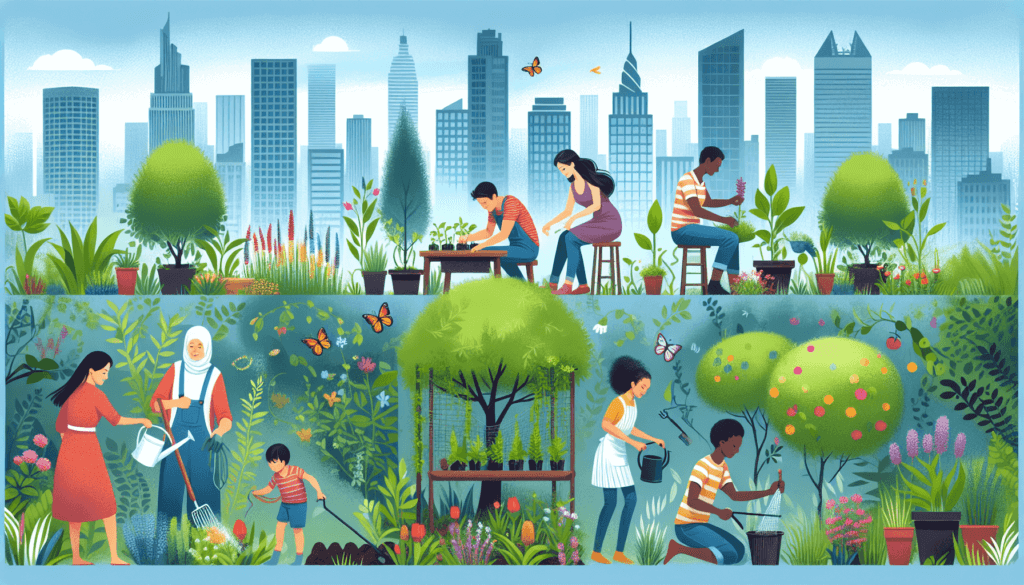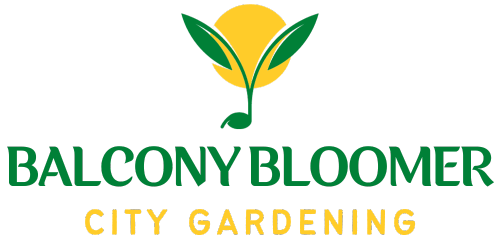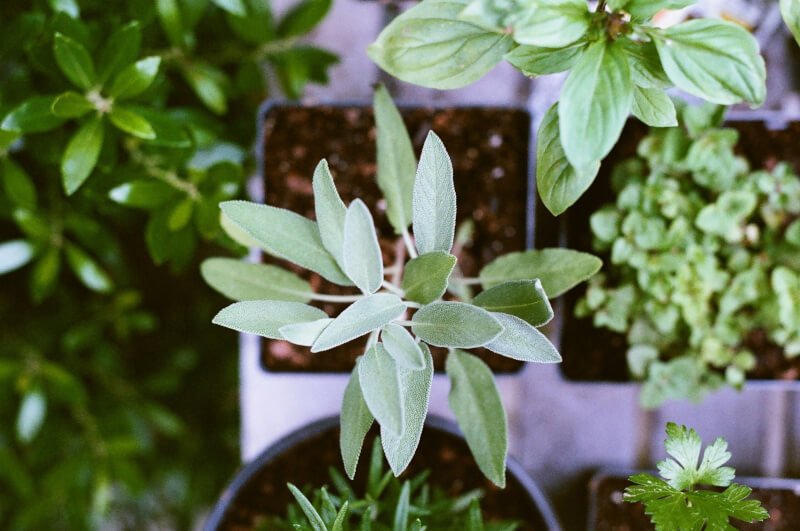Urban gardening is a fascinating and fulfilling practice that not only allows you to grow your own fresh produce but also provides numerous therapeutic benefits. This article takes a closer look at the positive impact urban gardening can have on mental and physical well-being. From reducing stress to increasing feelings of happiness and connectedness, delve into the world of urban gardening and discover how it can bring about positive changes in your life.
Improving mental health
Reducing stress and anxiety
Urban gardening has been found to have numerous therapeutic benefits for improving mental health. One of the key benefits is its ability to reduce stress and anxiety. Engaging in gardening activities, even in urban areas, allows you to escape from the fast-paced and hectic urban lifestyle. Spending time in nature and tending to plants can help you relax and find solace in the natural world. The peaceful and quiet environment of a garden provides a serene atmosphere that can soothe the mind and promote a sense of tranquility and calmness.
Promoting relaxation and mindfulness
Urban gardening also promotes relaxation and mindfulness. When you immerse yourself in gardening tasks such as planting, weeding, or watering, you are able to focus your mind on the present moment. This act of mindfulness allows you to let go of worries about the past or future, and instead, fully engage in the task at hand. The rhythmic and repetitive actions involved in gardening can be meditative and help you achieve a state of inner calm and relaxation. Additionally, being in touch with nature and observing the growth and changes of your plants can help you cultivate a sense of awe, wonder, and appreciation for the beauty of the natural world.
Improving mood and self-esteem
Furthermore, urban gardening has been shown to improve mood and self-esteem. The act of nurturing and caring for plants can give you a sense of purpose and accomplishment. Witnessing the progress of your plants as they grow and thrive can boost your self-esteem and bring a sense of satisfaction and joy. Gardening can also be a form of self-expression, allowing you to create a personalized and aesthetically pleasing space. As you see the positive impact of your efforts, you may experience increased happiness and a more positive outlook on life.
Physical health benefits
Increasing physical activity and fitness
In addition to the mental health benefits, urban gardening offers numerous physical health benefits as well. One of the key advantages is the opportunity for increased physical activity and fitness. Gardening tasks such as digging, planting, and pruning require physical exertion and can serve as a form of exercise. Regular gardening can help you improve your strength, endurance, and flexibility. It provides a practical and enjoyable way to stay active and fit while also achieving tangible results in the form of a thriving garden.
Providing access to nutritious food
Urban gardening also provides access to nutritious food. Growing your own fruits, vegetables, and herbs allows you to have a direct and immediate source of fresh produce. This can be particularly beneficial in urban areas where access to fresh and healthy food may be limited. By cultivating your own crops, you have control over the quality and authenticity of the food you consume. Eating homegrown produce not only ensures a higher nutrient content but also promotes a healthier diet and lifestyle.
Boosting immune system
Engaging in urban gardening can also boost your immune system. Spending time outdoors exposes you to sunlight, which is a natural source of vitamin D. Vitamin D plays a crucial role in maintaining a strong immune system and overall health. Additionally, being in contact with soil and plants exposes you to beneficial microorganisms called mycobacterium vaccae, which have been found to have immune-boosting properties. By creating a habit of regular urban gardening, you can strengthen your immune system and increase your resistance to various illnesses.
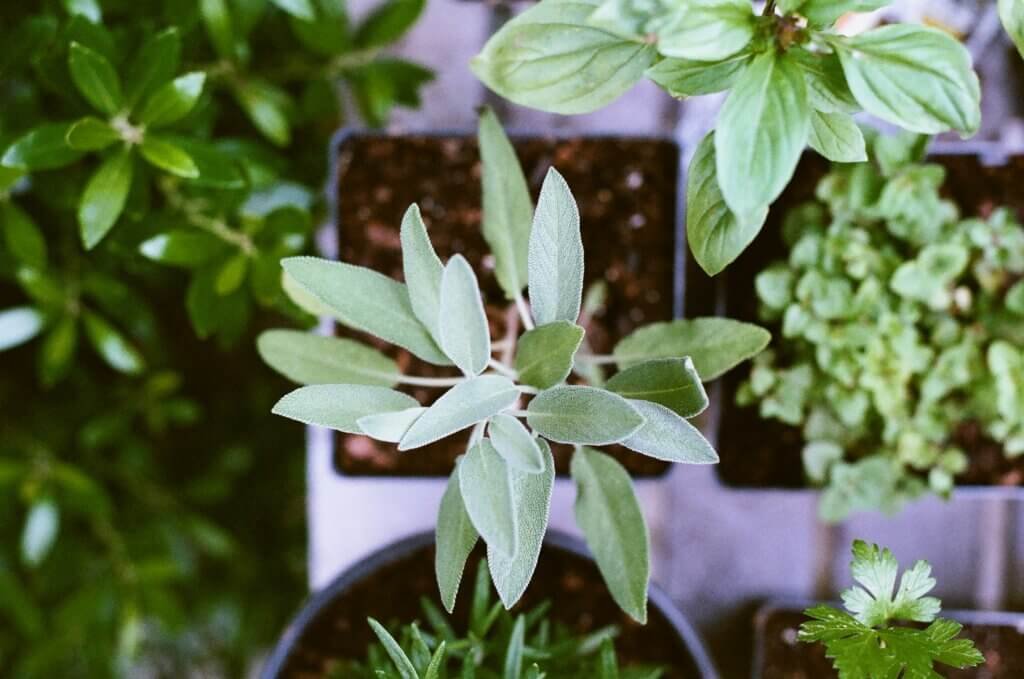
Creating a sense of community
Building social connections
Urban gardening has the power to bring people together and build social connections. Community gardens, where individuals or groups collectively tend to a shared garden, provide a space for people to interact, collaborate, and form meaningful relationships. Working alongside others with a shared interest in gardening fosters a sense of camaraderie and a supportive community. These gardens often become social hubs where people can meet, share gardening tips, and exchange knowledge and experiences.
Fostering neighborhood pride and cohesion
Furthermore, urban gardening promotes neighborhood pride and cohesion. Community gardens not only beautify the neighborhood but also create a sense of ownership and pride among residents. Taking care of the communal space and seeing it flourish instills a sense of belonging and unity, strengthening the social fabric of the community. Urban gardening initiatives can also serve as a catalyst for community-led projects, leading to increased collaboration and cooperation among neighbors. This shared experience of nurturing and growing plants together helps foster a greater sense of connectivity and collective identity.
Promoting environmental awareness
Creating green spaces in urban areas
Urban gardening plays a crucial role in promoting environmental awareness. By creating green spaces in urban areas, gardening initiatives contribute to the overall sustainability and well-being of cities. Urban areas are often characterized by concrete jungles and lack of greenery, which can have detrimental effects on both physical and mental health. By integrating gardens into urban landscapes, you can mitigate the negative impact of urbanization and create havens of biodiversity. Green spaces not only enhance the aesthetic appeal of cities but also provide a habitat for wildlife, improve air quality, and regulate temperature.
Reducing pollution and carbon footprint
Urban gardening also helps in reducing pollution and carbon footprint. Plants act as natural air filters, absorbing pollutants and releasing clean oxygen into the atmosphere. By growing a variety of plants in urban gardens, you can contribute to the reduction of air pollution caused by vehicle emissions and industrial activities. Furthermore, urban gardens promote sustainability by encouraging the use of organic and eco-friendly gardening practices. By minimizing the use of synthetic pesticides and fertilizers, urban gardeners play a significant role in reducing their carbon footprint and minimizing the impact on the environment.

Improving air quality
Filtering pollutants and improving oxygen levels
One of the key benefits of urban gardening is its ability to improve air quality. Plants, through the process of photosynthesis, absorb carbon dioxide and release oxygen, thereby increasing oxygen levels in the surrounding environment. This helps in combating air pollution and creating a healthier atmosphere. Additionally, plants have the ability to filter harmful pollutants from the air, such as volatile organic compounds (VOCs) and particulate matter. By incorporating a variety of plants and trees in urban gardens, you can significantly improve air quality and create a cleaner and fresher living environment.
Mitigating the urban heat island effect
Urban gardening also plays a crucial role in mitigating the urban heat island effect. Concrete, asphalt, and high-density buildings in urban areas absorb and retain heat, leading to increased temperatures in urban environments compared to surrounding rural areas. By introducing green spaces and vegetation through urban gardening, you can reduce surface temperatures and cool the surrounding areas. Plants provide shade, which helps in reducing the heat absorbed by buildings and pavements. This natural cooling effect not only makes urban environments more comfortable but also reduces the energy consumption required for air conditioning, thereby contributing to the overall sustainability of cities.
Encouraging sustainable living
Reducing food waste
Urban gardening encourages sustainable living through the reduction of food waste. By growing your own food, you have more control over the quantity and quality of the produce you consume. This enables you to harvest only what you need, minimizing food waste. It also allows you to utilize parts of plants that are often discarded, such as vegetable scraps or fruit peels, by incorporating them into compost or using them in recipes. Additionally, urban gardening promotes the concept of farm-to-table living, where food is produced locally and consumed fresh, thereby reducing the energy and resources required for long-distance transportation and storage.
Promoting composting and recycling
Furthermore, urban gardening promotes composting and recycling. Composting, the process of decomposing organic waste to create nutrient-rich compost, is an essential practice in sustainable gardening. By composting kitchen scraps, yard waste, and dead plant material, you can create organic fertilizer for your garden, reducing the need for synthetic fertilizers. Recycling of materials such as plastics and containers also plays a vital role in sustainable gardening practices. By reusing and repurposing materials, you minimize waste generation and contribute to the conservation of resources.
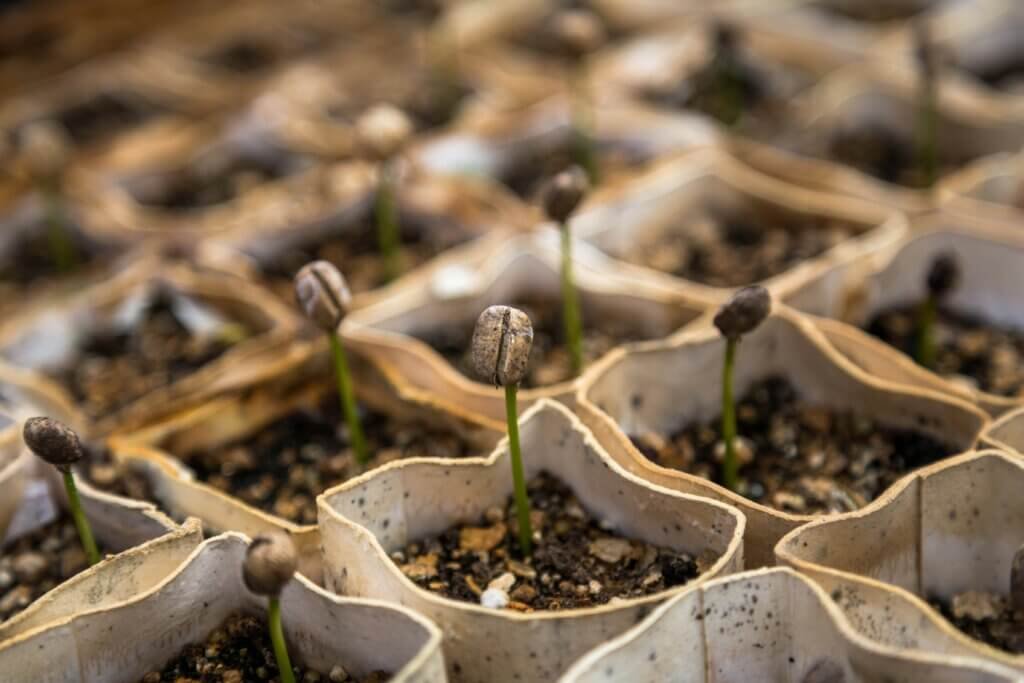
Enhancing food security
Increasing access to fresh produce
Urban gardening has the potential to enhance food security by increasing access to fresh produce. In urban areas, access to affordable and nutritious food can be a challenge, particularly in food deserts where there is a lack of grocery stores and fresh food options. By cultivating your own vegetables and fruits in urban gardens, you have a direct and reliable source of fresh produce. This not only improves your own food security but also creates opportunities for sharing and distributing surplus harvest within the community. Urban gardening initiatives can also partner with local organizations and food banks to address food insecurity and ensure that everyone has access to healthy and nourishing food.
Addressing food deserts
Moreover, urban gardening helps in addressing food deserts. Food deserts are areas where residents have limited access to affordable and nutritious food, often due to the absence of grocery stores or fresh food markets. By establishing community gardens and urban farming initiatives in these areas, you can bridge the gap and provide residents with the opportunity to grow their own food. Urban gardens can turn vacant lots or underutilized spaces into productive and sustainable areas, filling the void created by food deserts and promoting self-sufficiency in food production.
Providing therapeutic benefits for children
Developing a sense of responsibility and nurturing
Urban gardening provides therapeutic benefits for children, fostering a sense of responsibility and nurturing. By involving children in the process of gardening, they learn the importance of caring for living things and develop a sense of responsibility towards plants and the environment. Children can be assigned age-appropriate gardening tasks such as watering plants, weeding, or harvesting, allowing them to actively participate and contribute to the growth of the garden. This hands-on experience cultivates empathy, patience, and a deeper connection with nature, promoting their overall well-being and personal development.
Educational opportunities for learning about nature and ecosystems
Furthermore, urban gardening offers educational opportunities for children to learn about nature and ecosystems. As children engage in gardening activities, they gain first-hand knowledge about plant life cycles, the role of pollinators, and the importance of soil health. They learn about the interdependence of living organisms and the delicate balance of ecosystems. These practical experiences serve as a platform for environmental education, encouraging curiosity, critical thinking, and a broader understanding of ecological concepts. By integrating gardening into school curricula or community programs, children can develop a lifelong passion for environmental stewardship and sustainability.
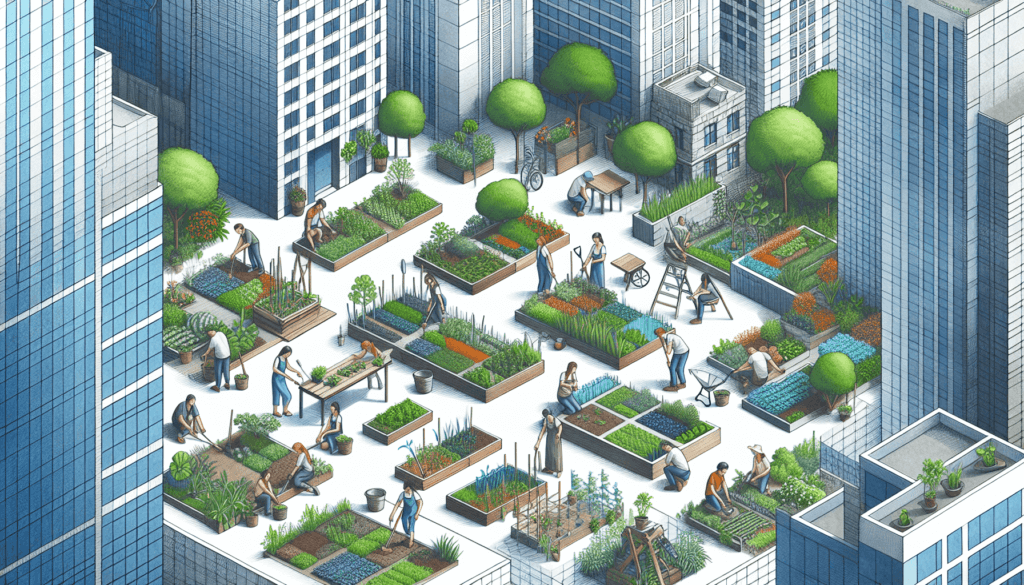
Supporting biodiversity
Providing habitats for wildlife
Urban gardening supports biodiversity by providing habitats for wildlife. As cities continue to expand, natural habitats for many species are lost or fragmented. By creating green spaces and urban gardens, you provide refuge for a wide range of plants and animals. Native plant species attract butterflies, bees, and birds, contributing to pollination and seed dispersal. Urban gardens act as stepping stones for wildlife, allowing them to move through urban areas and ensuring the survival of diverse species. By fostering a biodiverse ecosystem within urban environments, you contribute to the conservation of native flora and fauna and promote ecological resilience.
Preserving and protecting native plant species
Moreover, urban gardening plays a crucial role in preserving and protecting native plant species. Native plants are those that naturally occur in a specific region and have adapted to the local climate, soil, and wildlife. By incorporating native plant species in urban gardens, you help conserve the natural heritage of your region. Native plants provide food and shelter for wildlife, contribute to soil health, and require less water and maintenance compared to non-native species. By prioritizing the cultivation of native plants and avoiding the use of invasive species, you create a sustainable and resilient urban ecosystem that supports local biodiversity.
Improving urban aesthetics
Beautifying urban spaces
Urban gardening enhances the aesthetics of urban spaces. In the midst of concrete buildings and paved sidewalks, gardens bring color, life, and beauty to urban environments. Plantings of flowers, shrubs, and trees create visually appealing landscapes that soften the harshness of urban infrastructure. Well-maintained gardens, with their vibrant blooms and lush foliage, create a visual escape from the urban jungle and provide a welcome respite for residents and passersby. These green spaces also contribute to the overall livability and attractiveness of cities, making them more inviting and enjoyable places to live, work, and visit.
Reduction of noise and visual pollution
Additionally, urban gardening helps in the reduction of noise and visual pollution. Plants have the ability to absorb and block sound, acting as natural sound barriers in noisy urban environments. By strategically planting trees and vegetation, you can minimize the impact of noise pollution, creating quieter and more peaceful surroundings. Urban gardens also act as screens, shielding the view of unsightly buildings, parking lots, or industrial sites. This reduction in visual pollution helps create a more pleasant visual experience, promoting a sense of calmness and well-being.
In conclusion, urban gardening offers a multitude of therapeutic benefits that go beyond just beautifying spaces. It has significant positive impacts on mental and physical health, community building, environmental sustainability, and overall quality of life. Engaging in urban gardening provides an opportunity to connect with nature, develop a greater sense of responsibility, and contribute to a sustainable and harmonious urban environment. So grab your gardening tools, roll up your sleeves, and embark on this fulfilling journey that will not only transform your immediate surroundings but also nurture your well-being and that of your community.
